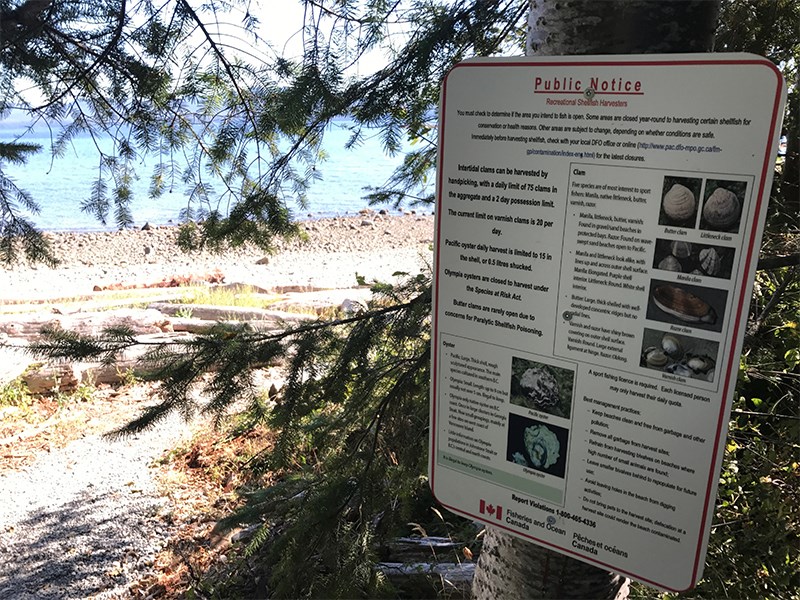Federal fisheries officers in Powell River seized close to 2,500 clams and 300 oysters and handed out $3,000 in fines for over-limit shellfish in two separate incidents earlier this month.
In both cases, Canadian citizens from the Lower Mainland were accompanied by non-Canadians who did not have valid tidal fishing licences.
Fisheries and Oceans Canada officer Matt Conley said the incidents involved different people, but their similarity was striking.
"It was shocking how similar they were,” said Conley.
Conley said in the second incident he had to track down the harvesters in town. They had been collecting from a beach closed because of contamination, he added.
The return of shellfish tourists to Powell River this summer has resulted in a flood of complaints from members of the public concerned about over-harvesting, said Conley.
"Our phone never stops ringing about individuals harvesting on the beach these days,” said Conley.
The daily limit for clams is 75 and 15 for oysters, said Conley. The maximum number of clams and oysters a person can be in possession of is two day's worth, he added.
Conley said Fisheries and Oceans Canada has put up more signs recently to inform the public about species on the beaches and fishing regulations.
He added that he encountered more than 25 tourists on a bus tour picking shellfish at Willingdon Beach, an area closed for shellfish collection due to fecal coliform contamination.
Local fisher Sam Sansalone said he is not surprised Fisheries and Oceans Canada is receiving a large volume of calls about the harvesting.
“This is a long-standing problem,” said Sansalone.
Sansalone added that tourists come because Powell River is accessible and there are little to no shellfish left on beaches around Vancouver due to overfishing.
“If we don't do something about this, we'll have to go to Bella Coola to get our seafood,” said Sansalone.
Tla’amin Nation hegus Clint Williams said the first nation has been receiving the same complaints. Over-harvesting clams and oysters from beaches is affecting his people’s cultural food fishing, said Williams.
“We have concerns about the number of legal licences, not to mention the poachers,” he said. “Sustainability is definitely a concern for our people.”
Williams said a number of informal meetings have taken place between Fisheries and Oceans Canada and Tla'amin representatives over the past few months to address the issue.
Conley said Fisheries and Oceans resource management officers are currently performing assessments of Myrtle Rocks Regional Park and Okeover area beaches to establish whether recreational shellfish harvesting rates are sustainable.
Williams said he does not put much faith in the ability of the federal government to make stock assessment decisions from Ottawa. Local herring populations were virtually wiped out in the early 1980s due to high-catch quotas for commercial fisheries.
“This is the same science that tells us our beaches are doing fine,” said Williams. “The level of harvesting that's happening is nowhere near sustainable. Our people have rights to resources in this area, but the resources are being clobbered.”
Williams said he appreciates the importance of tourism dollars being brought to the region, but would like to see more done to regulate the activity.
While poaching does occur on occasion, Fisheries and Oceans Canada’s position is that the majority of harvesting is being conducted by the book, said Conley.
Sunshine Coast Sport Fishing Advisory Committee chair David Burnett said it is fine to say harvesters are being checked and everyone is compliant, but he wonders if that is happening consistently.
“People clearly see there’s an issue,” said Burnett.
Communities should have a say in the management of their local resource, he added.
Powell River does not have a representative on the advisory committee, which holds its meetings on the lower Sunshine Coast.
Burnett said 87 per cent of the 171 responses to his Powell River shellfish tourism over-harvesting survey from last fall indicated support for a seasonal closure to protect stocks.



